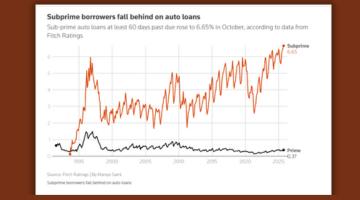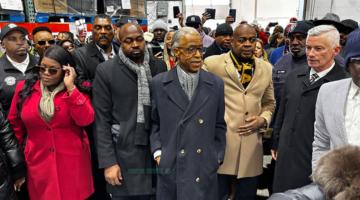Throughout history, trade restrictions have reshaped economies for good or for ill. As Trump increases tariffs across industries, it is clear that this move will not revitalize the economy as he claims. Rather, it stands to create further hardship for Black and working class people.
While it was not technically a tariff, the 1808 law prohibiting the importation of enslaved people to the U.S. from Africa and the Caribbean had the same effect, protecting domestic industries—in this case the breeding of the enslaved for commercial trade—from foreign competitors. For everyone but the enslaved of course, the ban worked like a charm, raising significantly the sale price that slaveholders could demand for a bondswoman or bondsman.
In the half-century that followed the embargo on international slave trafficking, the number of enslaved in the U.S. quadrupled from one to four million by the time the first shots of the Civil War were fired at Fort Sumter in 1861. The celebrated historian, Eric Foner, has attributed the phenomena to “natural increase” but aside from the predicate act that causes populations to grow, there was nothing natural about it. With so much money to be made, some planters abandoned the cultivation of agriculture and livestock altogether to transform their farms into factories solely for the breeding of slaves, the way that Detroit would churn out cars a century later.
Erecting twelve-foot-high fences topped with iron spikes to fortify the concentration camps and often forcing slave women to wear hoods during intercourse so that they could not identify their mates—who were sometimes related by blood—slaveholders industrialized the rape of Black women and girls, creating for all intents and purposes, an assembly line of sexual predation. The two largest breeding farms were in tobacco-growing regions on Maryland’s Eastern Shore, and in and around what would become the Confederate capital of Richmond, Virginia, which at its height, exported between 10,000 and 20,000 slaves every month to points South and West, raking in windfall profits that far eclipsed that of any other crop.
Similarly, the Southern African nation of Zambia surfaced from 75 years of British misrule in 1964, inheriting a workforce with fewer than 110 college graduates and an economy dependent almost solely on mining. Copper, cobalt and zinc accounted for more than a third of the country's gross domestic product at independence and 80 percent of its export earnings. The mines employed -- in one capacity or another--almost half the workforce, and the country manufactured very few goods.
To address Zambia’s reliance on imports, Zambia’s iconic liberation hero and first President, Kenneth Kaunda, adopted a policy known as “import substitution” in which a country seeks to replace the foreign trade flowing into a country with goods that are made locally. Between roughly 1964 and 1990, Kaunda nationalized the mines, expanded exponentially the economy's manufacturing sector and walled them off from foreign competition with import tariffs, sparking a period of robust growth.
That came to an abrupt end after the Berlin Wall fell in 1989 and the epoch of globalization began. Explaining his decision to raze tariffs against Canada and Mexico in 1988, Ronald Reagan said:
"Our peaceful trading partners are not our enemies, they are our allies. We should beware of the demagogues who are ready to declare a trade war against our friends, weakening our economy, our national security and the entire free world. All while cynically waving the American flag. The expansion of the international economy is not a foreign invasion, it is an American triumph. One we worked hard to achieve and something central to our vision of a peaceful and prosperous world of freedom. After the Second World War America led the way to dismantle trade barriers and create a world trading system that set the stage for decades of unparalleled economic growth. Yes, back in 1776 our founding fathers believed that free trade was worth fighting for. And we can celebrate their victory because today trade it's at the core of the alliance that secures peace and guarantees our freedom. It is the source of our prosperity and the path to an even brighter future for America."
In a tacit admission that Reagan got it wrong, President Donald Trump has promised to “liberate” the economy from its reliance on trade by rolling out on April 2 a wide range of tariffs on goods produced abroad, including a 25 percent tax on automobiles imported into the U.S. As was the 1808 ban on the transatlantic slave trade and import substitution policies across the global South in the postcolonial era, Trump’s tariffs are calculated to protect domestic industries from foreign competition, and repatriate the manufacturing jobs—albeit without unionization--that Reagan began to ship overseas forty years ago.
But as even a brief history of protectionism suggests, tariffs are a complicated matter and timing is everything. Economists largely agree that tariffs achieve their desired goal when they are part of a comprehensive industrial strategy such as Zambia’s program of import substitution. Trump has not articulated any such strategy and taxes on imported goods by themselves won’t reverse the broad set of trade policies that were set in motion during the Reagan White House, culminating in the North American Free Trade Act that took effect in 1994 under Bill Clinton.
Known as globalization, those trade policies were the plutocrats’ response to the stagflation crisis of the late 1970s and are intended to lower wages by offshoring the unionized manufacturing jobs that cut deeply into their profits. The strategy worked, but in reorienting an industrial economy to emphasize speculation over industrial production, financiers have depleted the economy of oxygen-- consumer buying power—that it needs to breathe.
Tariffs are likely to only worsen inflation that is higher than it has been in nearly 40 years. The owner of a suburban Washington D.C. microbrewery told reporters that his bottle caps are made in Mexico, and the bottles and base malts for all of his beers are imported from Canada.
Bill Butcher, the owner of Port City Brewing in Alexandria, Virginia, told the Associated Press that tariffs could increase his retail prices by as much as a third.
“It’s very frustrating because it’s hard enough running a small business when your supply chain is intact. But when you have these ridiculous disruptions in the supply chain, it just causes chaos.”
A customer identified as D.J. told the Associated Press:
“I just ordered a case here, so, if the prices go up, I honestly don’t know how often I’d order it again because it’s already like $15.”
Nor will tariffs alone slow China’s ascent to the pole position in the global economy. The dollar, as one example, is strong, or overvalued, which means that goods produced in the U.S. are not competitive on the international market. Navdeep Singh, a tech worker in Northern California told Black Agenda Report:
“Tariffs are a sign that the US wants to clearly reverse. . . everything that came after NAFTA. . . . The problem with Trump‘s efforts to re-industrialize the U.S. are. . (a) lack of skilled workers, very poorly developed supply chains, excessive. . .costs, no strategic industrial policy, absolute reliance on privatizations and . . .there are also. signs of industrial weakness and much lower productivity of labor. They can’t compete with Chinese cars, solar panels, or even toys. Walmart will be impacted because 80% of what it sells is made in China, but China doesn’t care about losing the Tupperware sales to Walmart. China has been de-linking from the United States economy gradually for many years now. They don’t care if they lose the opportunity to sell Tupperware at Walmart. They’re exporting huge projects, big industries to Asia and Africa instead. . .
The global economy is at an unprecedented inflection point. While all empires ultimately wane, the U.S. economy in the postwar era is the singular miracle of the Industrial Age. No country in recorded history has produced a working class that was so densely prosperous as was the U.S. for a period of 30 years beginning roughly in 1945. Consequently, the world has never witnessed the most industrialized nation in history transition to a post-industrial state. Said Singh:
“Basically we are seeing a situation where the former colonial world is going to trade with each other and bypass Europe and America.”
The slave breeding farms that raked in money hand over fist in the antebellum era ultimately failed because 13 percent of the population didn’t have enough money to contribute much of anything to the consumer economy. When Abraham Lincoln signed the Emancipation Proclamation on January 1, 1863, Black people owned about half of one percent of all assets. Today, according to the legal scholar Mehrsa Baradaran, African Americans continue to account for 13 percent of the population but own only about one percent of all assets nationwide. This increase of half one one percent over a period of 162 years is quite by design: in addition to lowering wages, Reagan began to hollow out the manufacturing sector because the shopfloor and the union halls were hubs for radical Black Power activists who led the worker’s movement that began with FDR’s New Deal administration in the 1940s.
Trump’s tariffs are woefully insufficient; to truly invigorate the U.S. economy, Americans need a raise, Black people most of all.
Jon Jeter is a former foreign correspondent for the Washington Post, Jon Jeter is the author of Flat Broke in the Free Market: How Globalization Fleeced Working People and the co-author of A Day Late and a Dollar Short: Dark Days and Bright Nights in Obama's Postracial America. His work can be found on Patreon as well as Black Republic Media.



















